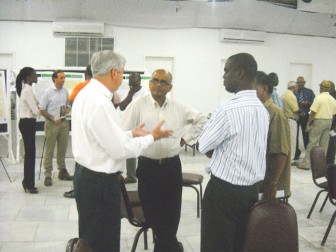In a letter today to Stabroek News and Kaieteur News, Prime Minister Sam Hinds defended businessman Fip Motilall over his trading of the licence for the Amaila Hydro Plant to Sithe Global.
Below is the text of the letter:
Dear Editors,
The headlines of Stabroek News(SN) of 2011-05-12, “Motilall sold Amaila licence to Sithe”, and of Kaieteur News (KN) of the same date, “Fip flips licence to Sithe Global” do our people and country great harm. SN and KN prefer to continue the innuendos about some sort of corruption and to be flippant about this tremendous development for our people and country, rather than to take the opportunity to educate our population at large, about what is a very common way in which big projects, such as the Amaila Falls hydropower project, get done.
The fact is that there are 100 or more good starts for every large project that makes it successfully to realization, and a particular idea may start and die a number of times before it becomes reality! We in Guyana have a good example in Omai – known to have gold since about the 1880s, with a German Company setting up an operation there in the 1890s, Anaconda in the 1930s; then Golden Star, one of the Junior Mining Companies as they are called, picking up the property in the mid 1980s, doing a lot of drilling, expending a lot of money, then seeking a big partner to take things forward. Placer Dome was interested for a while then Cambior came along: the mine was developed, and the mill was built, and in that partnership Golden Star received 35% of the shares for the prospecting work it had done.
Now back to Amaila. Since the mid 1980s, Amaila was recognized to be an interesting site for development, perhaps the site that best matched our needs. Mr Motilall began considering and pursuing that development in 1997; applied for and was granted an MOU in early 1998 on which he had Kleinschmidt & Assoc of Portland Maine, make a desk-top prefeasibility study. With a favourable outcome, Mr Motilall continued working, seeking partners at that stage and had HARZA Engineering (now MWH) prepare a feasibility study, partly for cash payment and partly for a carried interest. On the basis of the positive Feasibility Study an Interim Licence was applied for and granted in 2002 and work continued with the production of an EIA. Financial and all closure was close at hand with Scudder Latin America Fund and Leucadia about to take the lead, but among other things oil price was low, less than US$30/barrel; financing costs were high for this then purely privately financed project; the projected cost for electricity was greater than electricity from HFO fuelled stations, and the outward repayment cash flows were greater than fuel purchase flows.
That arrangement fell apart: Mr Motilall and his partners in SYNERGY continued working to refine the project, seeking and meeting other partners. Government was satisfied with their periodic reports and from time to time judged that it was reasonable to extend the Interim Licence. Eventually, Synergy won the interest and attention of Sithe Global now a part of the Blackstone Group. In time, as Sithe Global worked its way into the role of leading partner to take the Amaila Falls Hydropower project to construction and operation, on the request of Synergy and on the Government’s own consideration and demand, a new Interim Licence was issued in the name of Sithe Global in October 2009.
Mr Motilall and his partners have expended cash and invested lots of unpaid time in this development since he first began in 1997. From the work done along the way unto the entry of Sithe Global in 2007, an estimate of cash expenditure approaching US$5 million and unpaid time and other costs exceeding US$5 million is not unreasonable.
It is quite standard practice that a pioneer having developed a project to a certain point finds a bigger, stronger partner to take the project forward. The pioneer is rewarded in part or in whole with a cash payment at the time and some equity interest in the realized project. Depending upon the profitability of the project the pioneer would receive a multiple of his investment in cash and time. Of course the many more times when the project dies before realization, the pioneer receives nothing.
SN and KN who may see themselves as paragons of private enterprise would know this and should not insinuate differently to the public.
I hope that this response would be given prominence equivalent to the unkind headlines of 2011-05-11.
Samuel A. Hinds
Prime Minister
Below is the story that appeared in today’s edition
Motilall sold Amaila licence to Sithe
-will be compensated on successful completion of project
After acquiring the licence to develop the Amaila Falls Hydropower plant, Synergy’s proprietor Fip Motilall has sold it to Sithe Global and will be compensated on the successful completion of the long-awaited project.
The disclosure of the trade came at a public forum yesterday convened by Sithe Global. The revelation raises questions about whether Synergy could have been considered a serious contender for the licence in the first place and why Motilall would sell it if he was committed to developing the first major hydro scheme here. About eight years after his securing of the licence, Motilall’s company was also awarded a controversial contract for the building of the access road for the Amaila project.

Sithe’s Senior Vice President Jim McGowan made the disclosure about the transaction yesterday when answering questions from participants at a community meeting held at the Tower Hotel to discuss the updated Environmental and Social Impact Assessment Report (ESIA). Although, the meeting was officially set to take on an informal structure, McGowan and Consultant Philip Mooney agreed to sit and answer questions upon the persistent requests of some of the participants. The two officials answered questions posed mainly by chartered accountant Christopher Ram, Consumer Activist Ramon Gaskin and Kaieteur News proprietor Glen Lall and journalists.
Questioned by Ram about the role of Synergy Holdings in the construction of the hydropower plant, McGowan said, “Synergy Holdings was the developer of the project earlier on and helped get this project off the ground.” He added, “Sithe Global and its affiliate Amaila Falls Hydro Inc. have since acquired 100 percent interest of the project from Synergy and that Synergy is entitled under the agreement of the transfer of that asset to financial compensation upon successful completion of the project.”
When it was raised that a special procedure would have had to be adhered to according existing legislation, McGowan said he was unaware of this and that he could not answer. He, however, said that the agreement was confidential.
According to Section 25(1) of the Hydro-electric Power Act 56:03 “A licensee shall not be capable of assigning or transferring his license or of parting with the possession of any part of the licensed area without the consent of the President.” It is unclear whether President Bharrat Jagdeo consented to this as there has been no announcement by the government.
Motilall, and Harza Engineering Companies were granted an interim licence by the government in July 2002 to construct a hydropower plant in the country. The licence was set to expire in July of 2004, but was extended to July 28, 2006. The licence was again extended for one year in 2006. By this time, Harza had withdrawn from the agreement.

Efforts to contact Motilall yesterday for comment on his decision were unsuccessful. And when Stabroek News contacted Head of NICIL, Winston Brassington, he asked that this newspaper contact him today.
Last year, Synergy Holdings was awarded the US$15.4 million contract to construct the access road to the proposed site. The company is currently behind schedule and Motilall has been advised by the government to subcontract aspects of the project. The completion of the road in a timely manner is seen as key to securing financial support for the hydropower plant. Motilall had faced a barrage of questions about his ability to construct the road and to date has not provided details of work on similar projects.
The delay in the road and how this would impact the project was raised, and both McGowan and Mooney suggested that the first phase of the plant construction could start even before the road is complete.
McGowan said that the first phase of construction includes mostly design work and light travel to the site. Mooney explained that the traversing of the heavy equipment is likely to start several months after the contractor of the hydro plant would have been given the go ahead.
Meanwhile, McGowan once again said that Sithe is looking to secure funding for the project from lending institutions by “the third or fourth quarter” of this year and to start construction of the hydroplant before the year is out. With an estimated project cost of US$650M to $700M, he said that Sithe Global is likely to contribute some US$200M as equity towards the project. This would represent about 30 percent of the project cost.
Asked who was guaranteeing the loans from the lending institutions, McGowan was unable to provide a direct answer. According to him, if the company defaults there is limited recourse against the company. He said that in such circumstances, the lender’s right is to move in and to take ownership of the assets. The lenders would then have to restructure the deal and operate it with a new dealer.
McGowan, however, emphasized that Sithe Global is committed to building the Amaila Hydropower plant. He said that the company has undertaken extensive due diligence of the contractor for the hydropower plant, China Railway. Sithe’s construction management group, he said, will oversee construction being done by China Railway. However, the company’s officials seemed unaware that the company would need a special licence to actually start construction of the project but promised that all that was legally necessary it would adhere to.
When questioned as to why Sithe Global was not building the plant itself, McGowan said: “We are not a construction company. We are a project development company that has the expertise to try to get a project like this through the processes like the one we are going through tonight [last night].” He said that the company also had the financial capabilities to provide equity.
In an advertisement placed in newspapers over the weekend, Sithe Global said that it has over 300 years of collective experience in implementing large scale, socially-responsible power generation projects.
Meanwhile, in an ironic twist to last evening’s event where the prospect of Guyana being able to access cheap, reliable energy was on top of the agenda, the proceedings were briefly halted by a power outage.
Sithe Global is currently engaging in public consultations on the updated ESIA with the Amerindian communities likely to be affected by the plant. The company also held a community meeting on Tuesday in Linden. The comments from these consultations will be included in a revised ESIA, which is supposed to be released sometime in June.
The proposed hydropower plant is a 165MW facility, to be constructed at the Amaila and Kuribrong rivers





